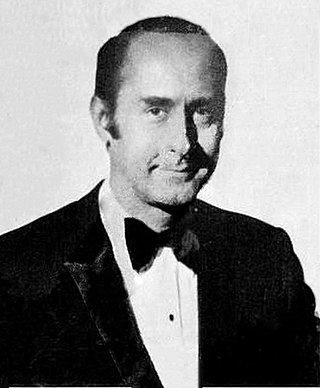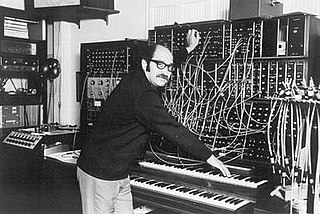Related Research Articles

Henry Mancini was an American composer, conductor, arranger, pianist and flautist. Often cited as one of the greatest composers in the history of film, he won four Academy Awards, a Golden Globe, and twenty Grammy Awards, plus a posthumous Grammy Lifetime Achievement Award in 1995.

Joseph Raymond Conniff was an American bandleader and arranger best known for his Ray Conniff Singers during the 1960s.

Morton Sanford Garson was a Canadian composer, arranger, songwriter, and pioneer of electronic music. He is best known for his albums in the 1960s and 1970s, such as Mother Earth's Plantasia (1976), He also co-wrote several hit songs, including "Our Day Will Come", a hit for Ruby & the Romantics. According to Allmusic, "Mort Garson boasts one of the most unique and outright bizarre resumés in popular music, spanning from easy listening to occult-influenced space-age electronic pop."
"Around the World" is the theme tune from the 1956 movie Around the World in 80 Days. In the film, only an instrumental version of the song appeared, although the vocal version has become the better known one. The song was written by Harold Adamson and Victor Young; Young died in 1956, several weeks after the film's release, and he received the Academy Award for Best Music, Scoring of a Dramatic or Comedy Picture posthumously. Young's orchestral version was a #13 hit on the Billboard charts in 1957. The recording by Bing Crosby was the B-side of the Victor Young version in 1957, on Festival SP45-1274 in Australia, and was a joint charting success.
"Auf Wiedersehen", or "Auf Wiederseh'n, Sweetheart", is a song written by German composer Eberhard Storch around 1950. Storch wrote the song in the hospital for his wife Maria as he was ill for a long time. It was originally sung in German by Rudi Schuricke and released on the 78 rpm record Polydor 48 374 H in 1950.
"Again" is a popular song with music by Lionel Newman and words by Dorcas Cochran. It first appeared in the film Road House (1948), sung by Ida Lupino. An instrumental rendition was used in the movie Pickup on South Street (1953). By 1949, versions by Vic Damone, Doris Day, Tommy Dorsey, Gordon Jenkins, Vera Lynn, Art Mooney, and Mel Tormé all made the Billboard charts.
"It's April Again" is a popular song that first appeared in the 1952 film Moulin Rouge. It became a No. 1 hit in the UK Singles Chart when recorded by Mantovani. The music for the film was written by Georges Auric; the original French lyrics were by Jacques Larue, with the English words by William Engvick. The Auric-Engvick song was published in 1953.
"Theme from A Summer Place" is a song with lyrics by Mack Discant and music by Max Steiner, written for the 1959 film A Summer Place, which starred Sandra Dee and Troy Donahue. It was recorded for the film as an instrumental by Hugo Winterhalter. Originally known as the "Molly and Johnny Theme", this lush extended cue, as orchestrated by Murray Cutter, is not the main title theme of the film, but an oft-heard secondary love theme for the characters played by Dee and Donahue.
"Gigi" is the title song from the 1958 Academy Award-winning film, directed by Vincente Minnelli. It was written by Frederick Loewe (music) and Alan Jay Lerner (words), sung by Louis Jourdan in the film. It then went on to win the Academy Award for Best Original Song in 1958.
Leslie David Reed was an English songwriter, arranger, musician and light-orchestra leader. His major songwriting partners were Gordon Mills, Barry Mason, and Geoff Stephens, although he wrote songs with many others such as Roger Greenaway, Roger Cook, Peter Callander, and Johnny Worth.
"Lara's Theme" is the name given to a leitmotif written for the 1965 film Doctor Zhivago by composer Maurice Jarre. Soon afterward, the leitmotif became the basis of the song "Somewhere, My Love". Numerous versions, both orchestral and vocal, have been recorded, among the most popular was the version by Ray Conniff Singers.

"My Prayer" is a 1939 popular song with music by salon violinist Georges Boulanger and lyrics by Carlos Gomez Barrera and Jimmy Kennedy. It was originally written by Boulanger with the title Avant de mourir 1926. The lyrics for this version were added by Kennedy in 1939.
"Wives and Lovers" is a 1963 song by Burt Bacharach and Hal David. It has been recorded by numerous male and female vocalists, instrumentalists and ensembles, most notably by Jack Jones in 1963. That recording earned the 1964 Grammy Award for Best Vocal Performance, Male, and peaked at number fourteen on the Hot 100 and number nine on the Easy Listening chart.
"I'll Never Fall in Love Again" is a song written by Lonnie Donegan and Jimmy Currie, and first released by Donegan as a single in 1962.

Johnny's Greatest Hits is a compilation album by vocalist Johnny Mathis that was released by Columbia Records on March 17, 1958, and has been described as the "original greatest-hits package". The LP collected all but one of the songs from the first six singles he recorded, including eight A- and B-sides that made the singles charts in The Billboard as well as three B-sides that did not chart and one new track that was co-written by Mathis but not released as a single.
"With These Hands" is a song written by Benny Davis and Abner Silver and performed by Eddie Fisher featuring Hugo Winterhalter and His Orchestra. It reached number 7 on the U.S. pop chart in 1953.
"Burning Bridges" is a song written by Walter Scott, and best known for its 1960 recording by Jack Scott, which was a #3 hit in the US. This was the only hit song for composer Walter Scott, who was no relation to Jack Scott.

Songs to Remember is an album by Mantovani and His Orchestra. It was released in 1960 by London.

Mantovani and His Orchestra Play the Music of Victor Herbert is an album of music composed by Victor Herbert and performed by Mantovani and His Orchestra. It was released in 1953 by London Recordings. On June 6, 1953, it was listed by Billboard magazine as the best selling popular album in the United States.
References
- ↑ "Tom Jones, "Love Me Tonight" Chart Positions" . Retrieved March 28, 2019.
- ↑ "Tom Jones, "Love Me Tonight" Single Release" . Retrieved March 28, 2019.
- ↑ "Top Records of 1969" (PDF). Billboard. Cincinnati, Ohio: Billboard Publications, Inc. December 27, 1969. Retrieved March 28, 2019.
- ↑ "Ronnie Aldrich and His Two Pianos, Destination Love". Discogs . 1969. Retrieved March 28, 2019.
- ↑ "The Casuals, Hour World". Discogs . July 1969. Retrieved March 28, 2019.
- ↑ "Ray Conniff and The Singers, Jean". Discogs . 1969. Retrieved March 28, 2019.
- ↑ "Martin Denny, Exotic Moog". Discogs . 1969. Retrieved March 28, 2019.
- ↑ "Ted Heath and His Music, The Big Ones". Discogs . 1970. Retrieved March 28, 2019.
- ↑ "James Last, Non Stop Dancing 9". Discogs . 1969. Retrieved March 28, 2019.
- ↑ "Johnny Mathis, Love Theme from "Romeo And Juliet" (A Time for Us)". Discogs . 1969. Retrieved March 28, 2019.
- ↑ "Mantovani, The World of Mantovani". Discogs . 1969. Retrieved March 28, 2019.
- ↑ "The Alan Caddy Orchestra & Singers, The Tom Jones Story". Discogs . 1970. Retrieved March 28, 2019.
- ↑ "Arthur Fiedler and the Boston Pops Orchestra, Arthur Fiedler Superstar". Discogs . 1971. Retrieved March 28, 2019.
- ↑ "Pink Lady, Pink Lady". Discogs . 1979. Retrieved March 28, 2019.